Cell divison - Study guides, Class notes & Summaries
Looking for the best study guides, study notes and summaries about Cell divison? On this page you'll find 87 study documents about Cell divison.
Page 2 out of 87 results
Sort by
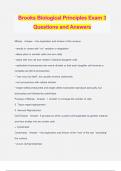
-
Brooks Biological Principles Exam 3 Questions and Answers
- Exam (elaborations) • 31 pages • 2024
-
- $13.49
- + learn more
Brooks Biological Principles Exam 3 Questions and Answers Mitosis - Answer- • the duplication and division of the nucleus • results in clones with *no* variation or adaptation • takes place in somatic cells (non-sex cells) • starts with one cell and creates 2 identical daughter cells • replicated chromosomes are evenly divided so that each daughter cell receives a complete set (46 chromosomes) • *can occur by itself*, but usually involves cytokinesis • not synonymous with ...
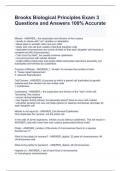
-
Brooks Biological Principles Exam 3 Questions and Answers 100% Accurate
- Exam (elaborations) • 20 pages • 2024
- Available in package deal
-
- $10.89
- + learn more
Mitosis - ANSWER_• the duplication and division of the nucleus • results in clones with *no* variation or adaptation • takes place in somatic cells (non-sex cells) • starts with one cell and creates 2 identical daughter cells • replicated chromosomes are evenly divided so that each daughter cell receives a complete set (46 chromosomes) • *can occur by itself*, but usually involves cytokinesis • not synonymous with cellular division • single-celled prokaryotes and single c...
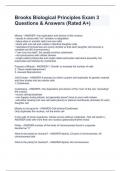
-
Brooks Biological Principles Exam 3 Questions & Answers (Rated A+)
- Exam (elaborations) • 21 pages • 2024
- Available in package deal
-
- $7.99
- + learn more
Brooks Biological Principles Exam 3 Questions & AnsweMitosis - ANSWER-• the duplication and division of the nucleus • results in clones with *no* variation or adaptation • takes place in somatic cells (non-sex cells) • starts with one cell and creates 2 identical daughter cells • replicated chromosomes are evenly divided so that each daughter cell receives a complete set (46 chromosomes) • *can occur by itself*, but usually involves cytokinesis • not synonymous with cellular...
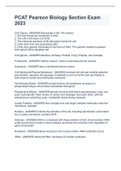
-
PCAT Pearson Biology Section Exam 2023
- Exam (elaborations) • 46 pages • 2023
-
- $12.99
- 1x sold
- + learn more
Cell Theory - ANSWER-Discovered in the 17th century 1. All living things are composed of cells 2. The cell is the basic unit of life 3. The chemical reactions of life take place inside the cell 4. Cells arise from only preexisting cells 5. Cells carry genetic information in the form of DNA. This genetic material is passed from parent cell to daughter cell 6 Kingdoms - ANSWER-Bacteria, Archaea, Protista, Fungi, Plantae, and Animalia Prokaryotic - ANSWER-"before nucleus", lacks a memb...
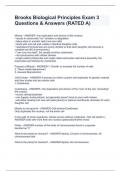
-
Brooks Biological Principles Exam 3 Questions & Answers (RATED A)
- Exam (elaborations) • 21 pages • 2024
- Available in package deal
-
- $12.99
- + learn more
Mitosis - ANSWER-• the duplication and division of the nucleus • results in clones with *no* variation or adaptation • takes place in somatic cells (non-sex cells) • starts with one cell and creates 2 identical daughter cells • replicated chromosomes are evenly divided so that each daughter cell receives a complete set (46 chromosomes) • *can occur by itself*, but usually involves cytokinesis • not synonymous with cellular division • single-celled prokaryotes and single c...
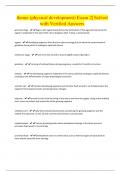
-
theme (physical development) Exam 2| Solved with Verified Answers
- Exam (elaborations) • 10 pages • 2024
-
- $11.49
- + learn more
germinal stage - begins with zygote being formed by fertilisation of the egg and ends when the zygote is implanted in the wall of the uterus (happens after 7 days). 2 week period. zygote - developing organism from the time sperm and egg fuse to about the second week of gestation during which it undergoes rapid cell divison embryonic stage - lasts from the second to around eighth week of gestation
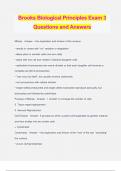
-
Brooks Biological Principles Exam 3 Questions and Answers
- Exam (elaborations) • 31 pages • 2024
- Available in package deal
-
- $13.49
- + learn more
Brooks Biological Principles Exam 3 Questions and Answers Mitosis - Answer- • the duplication and division of the nucleus • results in clones with *no* variation or adaptation • takes place in somatic cells (non-sex cells) • starts with one cell and creates 2 identical daughter cells • replicated chromosomes are evenly divided so that each daughter cell receives a complete set (46 chromosomes) • *can occur by itself*, but usually involves cytokinesis • not synonymous with ...
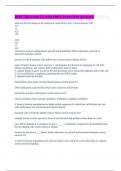
-
BISC 262 exam 2 || with 100% Error-free Answers.
- Exam (elaborations) • 6 pages • 2024
- Available in package deal
-
- $10.49
- + learn more
what are the five stages of the eukaryotic replication cycle? correct answers -G0 -G1 -S -G2 -M -G0- -G1 -S -G2 -M correct answers resting phase, growth and metabolism, DNA replication, Growth of structural elements, mitosis process in which bacterial cells split in two correct answers binary fission steps in binary fission correct answers 1. cell prepares for division by enlarging its cell wall, plasma membrane, and volume (DNA replication starts to form) 2. septum begins to g...
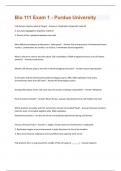
-
Bio 111 Exam 1 - Purdue University All Possible Questions and Answers with complete
- Exam (elaborations) • 7 pages • 2024
- Available in package deal
-
- $7.99
- + learn more
Cell division requires what 3 things? - Answer-1. Replication of genetic material 2. Accurate segregation of genetic material 3. Divison of the cytoplasm between two cells Main difference between prokaryotes + eukaryotes? - Answer-Size and presence of membrane bound nucleus - prokaryotes are smaller, no nucleus / membrane bound organelles What is the term used to describe about 150 nucleotides of DNA wrapped around a core of histone proteins? - Answer-nucleosome Meiotic cell division play...

-
Nervous System lecture Exam | Questions & 100% Correct Answers (Verified) | Latest Update | Grade A+
- Exam (elaborations) • 12 pages • 2024
-
- $11.49
- + learn more
afferent divison : SENSORY, impulses carried through the PNS toward the CNS efferent divison : motor, from CNS to PNS effectors nissl bodies : concentrations of RER and free ribosomes in the cytoplasm ganglia : clusters on PNS neuron cell bodies vesicular synpase : (chemical) involves neurotransmitters nonvesicular synpase 2 | P a g e : (electric) involves direct contact between cells interneurons : (association neurons) in the CNS between sensory and motor neurons astrocyte

Do you wonder why so many students wear nice clothes, have money to spare and enjoy tons of free time? Well, they sell on Stuvia! Imagine your study notes being downloaded a dozen times for $15 each. Every. Single. Day. Discover all about earning on Stuvia


